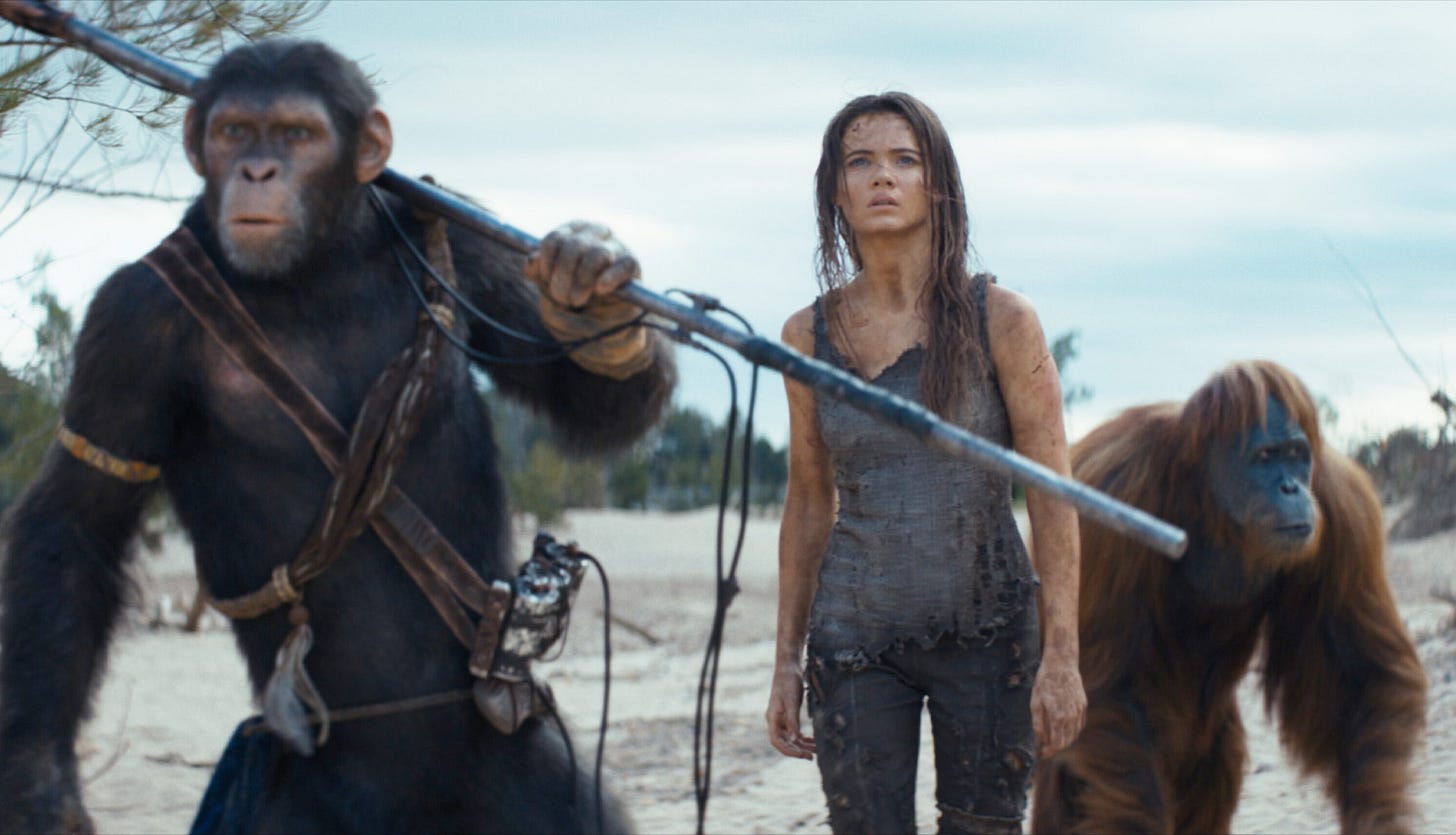Like any good cinephile, I have some cardinal rules when setting my own expectations for a film. The Planet of the Apes reboot series, which began in 2011 and is still going strong in 2024, stands as a personal proof point that there are always exceptions.
This year’s entry, Kingdom of the Planet of the Apes, is probably my least favorite of the bunch, but it is still excellent, still well worth your time, and, perhaps most notably, cements how surprisingly good the whole series is.
Let’s start with this: for a series this well regarded and financially successful, there is an astonishing lack of continuity among both the acting and directing talent. Rupert Wyatt directed the first film (he’s got almost nothing else of note in his filmography). Matt Reeves, whose C.V. fits more snugly with this kind of fare, directed the next two. Enter Wes Ball - he of Maze Runner fame - for Kingdom and the series didn’t really miss a beat, even as it leaped forward several generations in the story and, in so doing, left the great Andy Serkis and his character Caesar behind.
Indeed, Serkis is the only star that has defined the series. There has been plenty of star power to be sure - James Franco, Brian Cox, John Lithgow, Jason Clarke, Gary Oldman, Keri Russell, Woody Harrelson, William H. Macy - but other than Serkis and Toby Kebbell, that power has been contained to a single entry in the franchise.
So, we’ve got a hodgepodge of directing talent and only one real star across the collection of films - and, by the way, its a star whose face isn’t known to your average moviegoer and who isn’t even in all four of the films.
All of this is thrown in to the blender of what is effectively a series of prequels. The original Planet of the Apes series, which starred Charlton Heston, looms large, both in film history and over this reboot. So, too, does Tim Burton’s hideously terrible remake of the original from the 1990s, which, among its many sins, counts none worse than casting Mark Wahlberg as its star.
This prequel thing is probably the biggest of my cardinal rules violated by Planet of the Apes. There isn’t much I am more suspicious of these days than franchise fare that goes back in time to explain how something later in the franchise came to be. So often, prequels end up solving mysteries that no one needs solved, all in the name of squeezing every last dollar out of a piece of valuable intellectual property. A prequel is the surest sign of some studio executive trying to make the most cynical buck possible. It’s just that that’s not so with Planet of the Apes.
Some of this is probably down to the fact that Apes actually has a true mystery at the core of its world-building as opposed to being some contrivance meant to extend I.P. further than its meant to go. Unlike, say, Star Wars, which turned a single throwaway line of dialogue in to an entire movie, the very mythology of Apes is defined by the moment Heston stumbles upon the Statue of Liberty, a revelation that disorients (it’s been Earth all along?!) and poses all sorts of questions (what happened on Earth?!?!).
Conversely, the mystery is more or less solved by the first two films in the current series. Apes endures most of all because it is science fiction at its best. Through both the apes and the humans, it holds a mirror up to our worst impulses as a species as well as the qualities that make us worthy of redemption. Kingdom of the Planet of the Apes isn’t about how Earth was transformed so much as it is about who gets to keep cultural memories and how hard it is to escape the clutches of tribalism. As the last decade has shown, these kinds of arguments remain painfully unresolved even as the technology at our fingertips grows exponentially more sophisticated.
Having just watched Deadpool & Wolverine a few days before Kingdom, it’s hard not to juxtapose the two films. Wolverine, he of the X-Men, is bedecked in his yellow suit for the first time on film. But that yellow suit amounts to hollow nostalgia. He’s thrown in to yet another multiverse film alongside the ironic detachment and irritating fourth-wall breaking of Ryan Reynolds’ Deadpool. At its best, X-Men, just like Apes, holds up a mirror to human nature and poses questions about what we owe to each other as we hurtle in to an unknown future. In the case of Wolverine and X-Men that best feels a frustratingly long way off.
It’s true that Planet of the Apes might not have an iconic star or a big-name director, but for more than a decade, it’s been able to keep the main thing the main thing. So long as that’s true, it will remain compelling.



